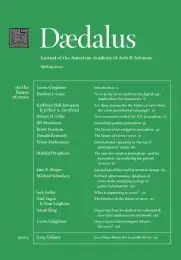News & the news media in the digital age: implications for democracy
Modern American journalism considers itself a “bulwark of democracy.” Journalists argue that they report the news so that the citizenry can inform itself and participate in the “conversation” that journalists believe is crucial to a democracy. According to what might be called bulwark theory, being informed also enables citizens to participate in politics, choose their political representatives, and instruct them on how they want to be represented.
The theory expresses journalism’s noblest democratic ideals, but it could stand some rethinking. Being informed is neither a motive nor a requirement for talking about or participating in politics. How well most citizens are informed is a debatable question, and since politics is a divisive conversational topic, precious few participate in the democratic conversation. Some citizens do, but some of them shout and scream. In reality, most political conversing, including that which is heard by elected officials, comes from journalists, commentators, panel talk shows, and journalist bloggers. And it is the news media themselves that offer up the public outlet for this continuing conversation.
To be sure, some ordinary citizens talk to their elected representatives, write letters to the editor, and email, blog, text, and tweet in political cyberspace. Nonetheless, the public opinion polls continue to be the most visible example of that citizen conversation, even if it is only one way and even if those willing to be polled are merely answering the pollsters’ questions.
Citizen participation has always been limited to a few, motivated mainly by self-interest or membership in a social movement. Consequently, it often generates protest or hard-to-satisfy demands. Politicians are therefore not always eager to have citizens participate, except at election time.
Working journalists are practitioners, not theorists, and do not concern themselves unduly with the shortcomings of bulwark theory. They see their job as supplying the news, leaving others to worry whether the citizenry is properly informed and performs its democratic duties.
Because the future of news is uncertain, it is necessary to go beyond bulwark theory to ask what exactly the news media and journalists do for democracy, and what will happen if the current mainstays–newspapers, magazines, and TV news–undergo drastic change and are replaced by websites and other digital media. However, I also want to ask what more the news media, old and new, could and should do for democracy, and what is beyond their power to do. My answers will deal mainly with the national news media although they would not differ significantly for regional and local news media.
. . .
